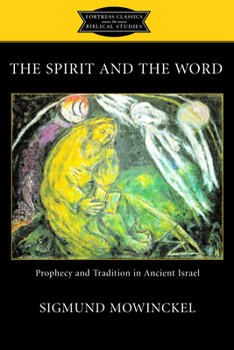Spirit and the Word
Select Format
Select Condition 
Book Overview
This volume brings together some of Mowinckel's most important and interesting work on the prophets. He begins by introducing the reader to the method of tradition history and how it is related to form criticism and literary criticism. From this groundwork, he goes on to explore how this method is essential for analyzing the prophetic literature in the Hebrew Bible. In order to make it more helpful for students, each essay has been supplemented with...
Format:Paperback
Language:English
ISBN:080063487X
ISBN13:9780800634872
Release Date:August 2002
Publisher:Fortress Press
Length:192 Pages
Weight:0.70 lbs.
Dimensions:0.5" x 6.0" x 9.0"
Customer Reviews
1 rating
the tradition and the saying
Published by Thriftbooks.com User , 18 years ago
This entry in the Fortress Classics in Biblical Studies series brings to fresh light some classic exemplars of twentieth-century Old Testament criticism, no small contribution in a moment when the discipline's fast-fragmenting methodologies threaten biblical scholars with amnesia. K.C. Hanson's introduction of Mowinckel manages to be both judicious and concise, clarifying his role as both heir and critic of the older literary criticism and a shaper of tradition criticism, one of the dominant strains of biblical criticism in the twentieth century. Subsequently the book's eleven essays are organized under three rubrics: `Part I: The Relationship of Methods; `Part II: Tradition History and the Study of the Prophets'; and `Part III: The Prophetic Experience'. The book's opening section (`Part I: The Relationship of Methods') displays Mowinckel's self-conscious efforts to move his guild beyond source criticism and on to a reckoning with his material's essential orality. The first of two essays (`1. Form, Tradition, and Literary Criticism', pp. 3-15) allows Mowinckel to identify a mediating position between literary criticism and its form- and tradition-critical successor. Indeed, he might have preferred the term `complement' to `successor', for he is vehement in his advocacy of a both/and approach to the literature rather than an exclusivity of one method over against another. `Scholarship', the author reminds us, `is not well served by slogans.' A review of the essays' titles leads one to anticipate a degree of overlap in content and presentation, a promise that the book keeps (`2. Tradition Criticism and Literary Criticism', pp 16-29). Yet this does not detract from its value. Indeed, in our day of methodological self-doubt, it is refreshing to observe a convinced practitioner from several angles as he drafts his apology and profiles his method. In the book's second essay, Mowinckel looks at examples of literary growth and editing from Kings/Chronicles, Ezra/Nehemiah, and Jeremiah/Baruch, and then asks whether similar growth of a tradition happened as well at the pre-literary stage. In this discussion, a polemical and sometimes defensive edge is detectable in Mowinckel's prose. Clearly an approach that has come to be regarded in biblical criticism as quite conventional was under some attack when Mowinckel wrote these pieces. A different `period note' rings in Mowinckel's naïve reference to the `laws' that govern oral and literary traditions as well as social and psychological processes. Mowinckel is probing at dynamics and results--fixed and malleable--that Fishbane would helpfully entitle `traditio' and `traditium'. The second set of collections (`Part II: Tradition History and the Study of the Prophets') contains seven of the book's eleven essays, which elucidate what would come to be considered the cardinal points of form and tradition criticism. The title of chapter three, for example, indicates the method's concern for the brief oracula






